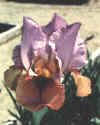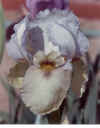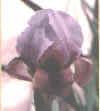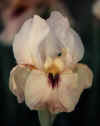Cultivars - A
Cultivars - B
Cultivars - C
Cultivars - D
Cultivars - E
Cultivars - F
Cultivars - G
Cultivars - H
Cultivars - I
Cultivars - J
Cultivars - K
Cultivars - L
Cultivars - M
Cultivars - N
Cultivars - O
Cultivars - P
Cultivars - QR
Cultivars - S
Cultivars - T
Cultivars - UV
Cultivars - W
Cultivars - XYZ
| |
|
LANCER (Howard Shockey, 1995) OGB Medium light orchid-violet, very large and sharp near-black pointed signals; beards old gold. Seraph's Jewel X Queen Sheba. |
|
 LAND OF ENCHANTMENT (McAllister, 1992) OGB Lilac standards, the color of a clear New Mexico sky at sunset, and adobe falls. Thunderstorm X Shades of Sunset. Gus Seligmann had dubbed one of his similarly colored seedlings the "Land of Enchantment" because that's the nickname of the state of New Mexico, but it wasn't vigorous enough to introduce. When I obtained an improved version, I remembered his name. A fully fertile
halfbred, whose seedlings are still under evaluation. LAND OF ENCHANTMENT (McAllister, 1992) OGB Lilac standards, the color of a clear New Mexico sky at sunset, and adobe falls. Thunderstorm X Shades of Sunset. Gus Seligmann had dubbed one of his similarly colored seedlings the "Land of Enchantment" because that's the nickname of the state of New Mexico, but it wasn't vigorous enough to introduce. When I obtained an improved version, I remembered his name. A fully fertile
halfbred, whose seedlings are still under evaluation. |
|
LASTING LEGACY (Hunt-McAllister, 1988) OGB Flesh-pink standards; flesh-toned falls heavily veined and dotted
greyish-red and overlaid with a rose-pink flush. Susimac X Fourteen for Rachel. Brocade effect is reminiscent of the textured veins found in the
oncos, like its maternal grandmother, I. susiana. Crossed with Gene's Guardian Angel, it has given me some striking seedlings with excellent rounded form and interesting veining patterns. I recommend it for work toward
susiana-type pattern and form. One of Gene's long-standing goals was to put
susiana-type veining on an arilbred, and this seedling struck me as a lasting legacy for the further pursuit of that goal. |
|
 LEAH RALLS (Hunt, 1984) OGB+ Pale blue-white standards; greyed-yellow falls dotted light brown. Signal area striped violet-brown. No pollen, but fully pod fertile. Capitola X (Sylphide x Kalifa Gulnare). Sometimes throws small signals, sometimes intricate dotting. Has given me some very nice pastels, but its offspring also tend to have no pollen so I don't recommend it for beginners. Named in honor of Gene's irisarian friend. LEAH RALLS (Hunt, 1984) OGB+ Pale blue-white standards; greyed-yellow falls dotted light brown. Signal area striped violet-brown. No pollen, but fully pod fertile. Capitola X (Sylphide x Kalifa Gulnare). Sometimes throws small signals, sometimes intricate dotting. Has given me some very nice pastels, but its offspring also tend to have no pollen so I don't recommend it for beginners. Named in honor of Gene's irisarian friend. |
|
LEO'S LORT-CHEN (Clark-McAllister, 1992) OGB+ Yellow bitone with burgundy spot. From Chenik Aga x I.
lortetii, which would normally result in a triploid but a chromosome count suggested that it came from an unreduced lortetii gamete. It is an unusually good pollen parent and occasionally sets pods. Introduced offspring include Hallelujah Chorus, Ora J. Seale, and Sunrise in Glory – and, through them, it has many other registered descendants. It is not the impressive garden subject we've come to expect of Leo Clark's classic near-arils, but is definitely worth crossing with a variety of halfbreds just to see what happens. It was originally distributed as a seedling under the name
Lort-Chen, following Leo's convention of listing the pollen parent first, and I chose this name to preserve its continuity. |
|
LET IT SHINE (Hunt-McAllister, 1990) OGB Bright yellow near-self with bright yellow beard tipped tangerine. Burgundy-black spot. Leo's
Lort-Chen X Esther's Son. An enthusiastic parent, it's produced some nice seedlings in yellow, yellow with brown markings, and various shades of brown – and it tests positive for the tangerine factor. Another case of a musical phrase that landed on my list of names-in-search-of-an-iris until the proper candidate came along. |
|
LIGHTS OF ARABIA (Rich, 1994). OGB S. bright butter yellow, strong midribs; F. bright butter yellow, mahogany signal; yellow beards. Another of Jonnye's incredibly complex pedigrees. |
|
 LILLIAN WHITE (Hunt-McAllister, 1991) OGB Flower opens with very pale amethyst standards and yellowish ivory falls, but expands and pales to a near-white self with wide gold beard and burgundy veining in the signal area. ((Esther the Queen x Dove Song) x (Esther's Son x Leo's
Lort-Chen)) X Esther's Son. Not much to report on its offspring beyond some nice pastels because most of its seeds have been given away – but I do plan to try it with the
pseudo-plicatas as well as other pastels with delicate patterns. Named for a friend who was instrumental in saving Gene's selected seedlings. LILLIAN WHITE (Hunt-McAllister, 1991) OGB Flower opens with very pale amethyst standards and yellowish ivory falls, but expands and pales to a near-white self with wide gold beard and burgundy veining in the signal area. ((Esther the Queen x Dove Song) x (Esther's Son x Leo's
Lort-Chen)) X Esther's Son. Not much to report on its offspring beyond some nice pastels because most of its seeds have been given away – but I do plan to try it with the
pseudo-plicatas as well as other pastels with delicate patterns. Named for a friend who was instrumental in saving Gene's selected seedlings. |
|
LOOKING FOR LYDIA (Hunt, 1984) OGB Iridescent violet standards. Cream ground of falls has burgundy veins blending to area of dark dusty rose near the center. Small black signal spot. Dorcas X Mary of Magdala. This one produces many shades of reddish violet. Crossed with sun-resistant reds, like Deborah's Song, it produces a nice range of colors. A fully fertile halfbred that I recommend for
beginners. The Biblical Lydia was a seller of purple. The iris produces it. |
|
LOUDMOUTH (Rich, 1970). OB/OB- Bagdad Beauty X Knotty Pine. S dark fuchsia violet, veined darker violet; F dark fuschsia violet, white hafts, boldly veined darker violet; veins over balance of falls; large black signal surrounding tip of orange beard. Still one of my favorite
arilmedians. |
|
 LOVE CONQUERS ALL (Hunt-McAllister, 1987) OGB+ Wisteria-violet standards; reddish-brown falls; deep purple-brown beard and deep burgundy signal. Presumably triploid, from Teucros X Fourteen for Rachel. Limitedly fertile, but not
an enthusiastic parent and none of its offspring have been selected for
introduction. The phrase that had been on my list of names-in-search-of-iris for some time, and the vicissitudes that this particular seedling had been through seemed to say that the time had come use it. LOVE CONQUERS ALL (Hunt-McAllister, 1987) OGB+ Wisteria-violet standards; reddish-brown falls; deep purple-brown beard and deep burgundy signal. Presumably triploid, from Teucros X Fourteen for Rachel. Limitedly fertile, but not
an enthusiastic parent and none of its offspring have been selected for
introduction. The phrase that had been on my list of names-in-search-of-iris for some time, and the vicissitudes that this particular seedling had been through seemed to say that the time had come use it. |
|
 LOVE SHINES IN (Hunt, 1988) OGB Light pinkish-lavender standards. Pale yellow falls lightly washed lavender to produce overall effect of salmon pink. Burgundy signal spot. (Esther the Queen x Dove Song) X Esther's Son x Leo's Lort-Chen). The pod parent was probably the seedling later introduced as Martha Mia. With different mates, this has produced everything from near ivory to deep smoke. Exceptionally good parent when used in pinkish lines, throwing pinkish and pinkish-yellow blends with excellent form, and an occasional surprise in red-violet. The offspring it produced with Gene's Little Secret are extremely diverse, with some of them among the best of the type. Tests positive for the tangerine factor. Has produced some spectacular breaks when crossed with pseudo-plicatas. I recommend it highly for beginners. When I was unable to come up with an adequate descriptive name for this one, I opted for a song title that conveys an overall impression rather than a detailed description. LOVE SHINES IN (Hunt, 1988) OGB Light pinkish-lavender standards. Pale yellow falls lightly washed lavender to produce overall effect of salmon pink. Burgundy signal spot. (Esther the Queen x Dove Song) X Esther's Son x Leo's Lort-Chen). The pod parent was probably the seedling later introduced as Martha Mia. With different mates, this has produced everything from near ivory to deep smoke. Exceptionally good parent when used in pinkish lines, throwing pinkish and pinkish-yellow blends with excellent form, and an occasional surprise in red-violet. The offspring it produced with Gene's Little Secret are extremely diverse, with some of them among the best of the type. Tests positive for the tangerine factor. Has produced some spectacular breaks when crossed with pseudo-plicatas. I recommend it highly for beginners. When I was unable to come up with an adequate descriptive name for this one, I opted for a song title that conveys an overall impression rather than a detailed description. |
|
LUELLA DEE (Wilson, R. 1996). OGB S pale violet, lightly veined violet, midrib gold; F cream, lightly veined and dotted violet, large soft brown signal; beards wide, grey hairs tipped orange. Superb form. (Tuesday Song x Holden Ho5) X Onlooker.
|
|